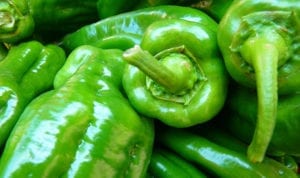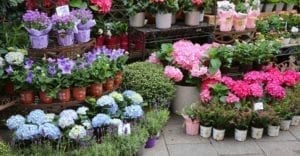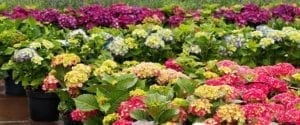 Hatch green chiles are all the rage in the late summer and fall, but try the Colorado chiles at Denver-based Country Fair Garden Center and you might become a convert for life.
Hatch green chiles are all the rage in the late summer and fall, but try the Colorado chiles at Denver-based Country Fair Garden Center and you might become a convert for life.
“Everybody has their own thoughts about chiles,” says Marketing Manager Candi Gerace, “but these are bigger, thicker, meatier. I’ve always done the Colorado chiles.”
The smell of chiles roasting has near-universal appeal. Smell is the only one of our five senses that doesn’t get run through a filter before identification, which is why it can send us immediately into a reverie. It’s also the sense most strongly associated with memory. That’s one reason visiting a garden center is worthwhile any day, any month.
Yet gardening is, for many, a seasonal hobby. That’s a challenge garden centers must contend with year after year, with up to 2/3 of annual sales concentrated in the spring months. Riding out those seasonal fluctuations requires strategic thinking, but it can be fun, too.
Community engagement through workshops and fares
“As far as increasing sales in the off season, we try different things all the time, whether it be different types of sales, bringing in different types of product different classes, additional advertising,” Gerace tells us.
“The chile roasting is great. … We started chile roasting in August, so we’ve been doing it about four weeks now. We get our chiles in Colorado—they’re Pueblo chiles. We chose to support our local farmers.”
Gerace is excited about several upcoming workshops and events. For instance, Country Fair is hosting a cleanup and lawn care workshop on October 7. The following Saturday there will be a pumpkin painting, and on October 21st, children gearing up for Halloween can enjoy a spooky fairy garden.
After all, nature doesn’t just hang up her hat from October to March.

“We increase house plant sales and we do a large Christmas—of course, poinsettias, Christmas trees, live trees. And that’s what we focus on,” Gerace continues. “We bring in a few more lines, offer a lot of hands on classes, especially in the fall and around the holidays. So people can make their own wreaths or their own mantel piece. We do a lot with house plants in January/February making succulent gardens and cactus gardens.”
The garden center probably has 20 varieties of succulent at a given time, Gerace estimates.
“You almost never have the exact plants. It’s just the nature of this industry. You get the same species, different varieties. … But we have all the basics, all the time.”
County Fair Garden Center recently opened a second location, and our software point of sale and inventory management system, NCR Counterpoint, helps with ordering, inventory and transfers between the two stores. Check out their calendar for educational events and fairs like the annual Holiday Fair in November.
New specialties
Another option to attract more off-season business is specializing in indoor gardening and hydroponics. That’s a culture decision, because here in Colorado it attracts a different set of clientele than people who grow seasonal produce or perennials. Mountain Lion Garden Supply, in Laporte, CO, specializes in grow lights, indoor pest management and fertilizer in addition to outdoor gardening.
Founder Mike Walsh is a graduate of the Colorado State University Horticulture program with a concentration in Floriculture. Walsh does consulting for garden centers wishing to tap into the indoor gardening market. He too is a client of ours.
Contact Mountain Lion Garden Supply.
Relationships
The off season is a great time to focus on business planning and maintenance activities, special events and cultivating relationships. Other local businesses and organizations are often great collaborators. For instance, Country Fair Gardens is a pick up location for Grant Farms, a CSA (Community Supported Agriculture) based in Wellington, CO. It’s been a fruitful partnership that brings people in during the off season.
“They’re a great group of people,” says Gerace with a smile.
It’s even a good time to talk in person with other business owners to see how they manage seasonal fluctuations in sales.
Operations
First, for timing your purchases to avoid excess inventory or spoilage, a user-friendly, reliable inventory planning system like NCR Counterpoint is invaluable.

If you’re running a garden center, you believe gardening is a fun, year-round activity. With a good off-season marketing strategy, you can convert “fair-weather” gardeners to year-round customers with winter greenhouse miniature gardening, indoor fairy gardens, seasonal produce like autumn squash (so wonderful) and hydroponics.
“No matter what type of seasonal business you own, it’s possible to be profitable all year round if you’re disciplined, manage your time and explore your options,” Entrepreneur Magazine, reports.
Read general tips about what garden centers and other businesses have done to bring in additional off-season revenues and manage cash flow here and here.
Remember that the predictability of the seasons can be an advantage because it allows garden centers to plan. Gone is the luck and guesswork some sectors like commodities face. Although seasonality is a big challenge, it provides managers with something of a rudder, compass and steering wheel.
Trends and fun
Fairy gardening. It’s a thing. Wings optional.
“Fairy gardening is still going very strong,” Gerace tells us. “They put a lot of accessories in their gardens, little fairies, little benches, basically anything that we have in our home I can find in fairy gardening now.
“They’re cute, they’re fun, they can be indoor, they can be outdoor. All my classes, we design them to be more indoor, being in Colorado.”
Also ask yourself what you can do to create more of a destination shopping experience. Children’s activities are a great way to do that. One garden center in Canada even added a beekeeping operation and petting zoo, although before you go bonkers, that’s more of a point of interest than a suggestion.
Keep bringing la passion
“I love plants, love plants. That’s why I do what I do,” Gerace beams.
“And that’s what’s rewarding, is to put gardens together for people just so they can enjoy the beauty, or enjoy the produce from an actual vegetable garden.”
It’s true: eating a home grown tomato just ruins store-bought produce.



